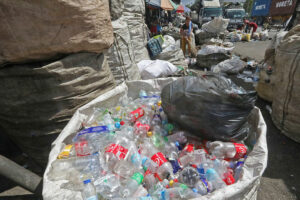By Justine Irish D. Tabile, Reporter
THE REVENUE to be earned from a single-use plastics tax may not be as strong as the Department of Finance assumes, the former head of the plastics industry association said.
“The government’s assumption that these taxes will generate significant revenue, mirroring the experience with sugar-sweetened beverages, is flawed,” according to Danny Ngo, former president of the Philippine Plastics Industry Association, speaking to BusinessWorld via Viber.
“The Philippines, currently facing economic challenges, may not be in a position to bear the additional burden of excise taxes on essential items like plastic bags,” he added.
The Department of Finance has identified the excise tax on single-use plastics as a priority tax reform measure. It is projected to yield P21.644 billion in revenue between 2025 and 2027.
In May, the National Economic and Development Authority asked legislators to pass a measure that seeks to impose a P100 excise tax for every kilogram of single-use plastics exiting the factory or released by the Bureau of Customs.
The House of Representatives approved its version of the bill in November 2022, while a similar measure is pending with a Senate committee.
Mr. Ngo also warned that taxing plastics could “undermine” the Extended Producer Responsibility (EPR) Act, also known as Republic Act 11898.
“The reality is that consumers, already facing rising costs of living, may resort to alternative, potentially less sustainable, packaging options. This could lead to increased waste generation and undermine the Extended Producer Responsibility framework’s effectiveness,” he added.
He said that the EPR law already places the responsibility for managing the entire life cycle of a product on the producers, which promotes a circular economy.
“The law’s stringent requirements, exceeding those of developed nations, demonstrate the Philippines’ commitment to achieving a high standard of environmental responsibility,” he added.
He said the government should do more to make policy more coherent, weighing the economic realities, viable alternatives, and potential consequences of the tax.
He added that such a tax could embolden the underground economy, incentivizing tax evasion, smuggling, the manufacture of substandard products, and environmental degradation. He added that the monitoring of single-use plastics so they can be properly taxed will be challenging.
“In light of these considerations, it is imperative to reassess the potential implications of imposing an excise tax on single-use plastic bags in the Philippines and explore alternative strategies that prioritize both economic growth and environmental sustainability,” he said.

